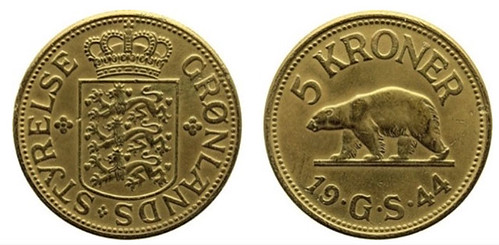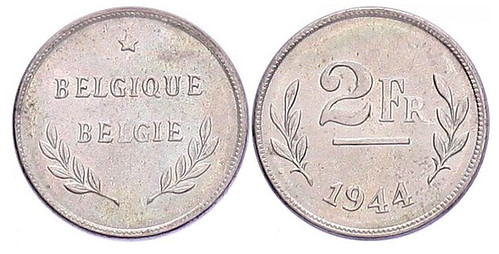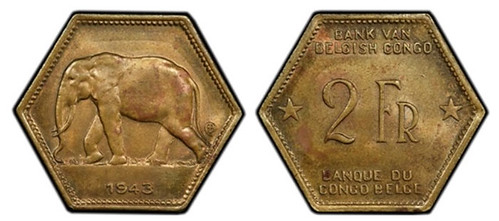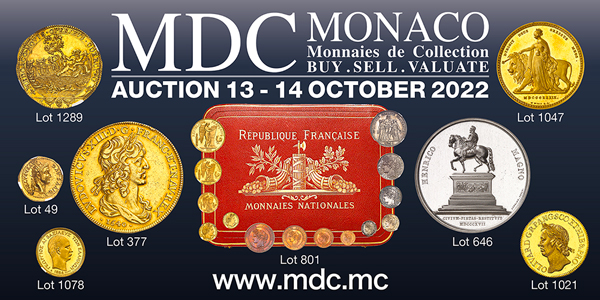
PREV ARTICLE
NEXT ARTICLE
FULL ISSUE
PREV FULL ISSUE
V25 2022 INDEX E-SYLUM ARCHIVE FOREIGN COINS STRUCK BY U.S. MINT DURING WWIIA CoinWeek article by Tyler Rossi examines foreign coins struck by the U.S. Mint during WWII. Here's an excerpt - see the complete article online. -Editor As with during World War I, the United States Mint played a vital role in supporting the Allied powers throughout World War II. Through the 1874 Act of Congress authorizing the production of foreign coins, the Mint was able to supply 26 countries across the globe: Australia, the Belgian Congo, Belgium, Bolivia, Cuba, Curaçao, the Dutch East Indies, the Dominican Republic, Ecuador, El Salvador, Ethiopia, Fiji, France, French Indochina, Greenland, Guatemala, Honduras, Liberia, Netherlands, Nicaragua, Panama, Peru, the Philippines, Saudi Arabia, Surinam, and Venezuela. Of these, five were either colonies and do not exist anymore or have since changed their name. All of these countries were suffering the direct and indirect economic effects of the war. Some, like Belgium and the Philippines, had been invaded and suffered extensive physical damage, while others had to host a large number of troops or underwent a massive expansion of industrial war production. Regardless, there was a sudden and growing need for coinage that coincided with a lack of ability to fulfill that need. Greenland At the start of the war, thousands of US servicemen were sent to Greenland. At the time, the island had a small population of 18,000 indigenous people and fewer than 500 Danes. When local coinage began to disappear, the US Mint struck 100,000 5 Kroner coins. The obverse depicts the standard Danish royal coat of arms surrounded by the legend GRØNLANDS STYRELSE, which is the name of the country's government. Designed by Chief Engraver of the US Mint Gilroy Roberts, the reverse shows a polar bear with the denomination above and the date below, split by a GS. Because Greenland was technically still controlled by Denmark, the obverse is copying contemporary Danish coin designs. Since in 1944 one Danish Kroner was worth approximately 20 US cents, this coin was equivalent to $1. Belgium and the Belgian Congo In 1944, the Philadelphia Mint also struck 25 million 2-franc coins for Belgium, using blank 1943 steel Lincoln cent planchets. As an Allied Occupation issue, these coins were issued to US troops as early as September 1944 for use in liberated Belgium. This issue is connected to two error coins, both off-metal types. More commonly known is the US 1944 steel Lincoln cent. This is because the Mint used the 1943 steel planchets for this coin. It is believed that some blanks made their way between the Lincoln cent dies. Additionally, an unknown quantity of 2 Franc coins were struck on Dutch silver 25 cent blanks. The year prior, the Philadelphia Mint also struck 25 million francs, this time for the Belgian Congo, which was run as a private colony, personally owned by King Leopold II. A hexagonal coin, these were likely struck in recycled bronze like the 1944 French 2 Franc.
This piece presents one of the largest design errors of any coin designed by the US Mint. Depicting a simple elephant above the date as the obverse design, the reverse is simply the denomination -2 FR- surrounded by the legend Bank of Congo translated into both Dutch and French. The Dutch legend BANK VAN BELGISH CONGO was missing the Great quiz questions for your numismatic friends - What coin produced by the U.S. Mint is six-sided? What coin produced by the U.S. Mint depicts an elephant? What coin is both? -Editor
To read the complete article, see:
Wayne Homren, Editor The Numismatic Bibliomania Society is a non-profit organization promoting numismatic literature. See our web site at coinbooks.org. To submit items for publication in The E-Sylum, write to the Editor at this address: whomren@gmail.com To subscribe go to: https://my.binhost.com/lists/listinfo/esylum All Rights Reserved. NBS Home Page Contact the NBS webmaster 
|



